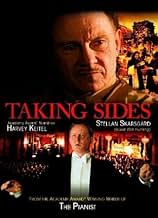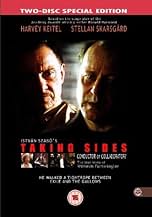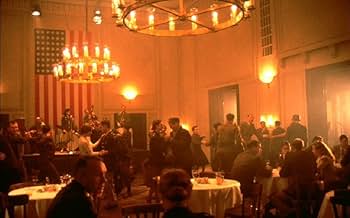Taking Sides
- 2001
- Tous publics
- 1h 48min
Après la fin de la Seconde Guerre mondiale, un célèbre chef d'orchestre allemand est accusé de loyauté envers le régime nazi. Il affirme que l'art et la politique sont deux choses distinctes... Tout lireAprès la fin de la Seconde Guerre mondiale, un célèbre chef d'orchestre allemand est accusé de loyauté envers le régime nazi. Il affirme que l'art et la politique sont deux choses distinctes. Un enquêteur pense le contraire.Après la fin de la Seconde Guerre mondiale, un célèbre chef d'orchestre allemand est accusé de loyauté envers le régime nazi. Il affirme que l'art et la politique sont deux choses distinctes. Un enquêteur pense le contraire.
- Récompenses
- 9 victoires et 3 nominations
Histoire
Le saviez-vous
- AnecdotesTaking Sides (2001) was shot on location in Germany with the dialogue in German and English, although in the version released in the US and the UK the dialogue is only in English.
- GaffesWhen Major Arnold is listening to the recording of Beethoven's Fifth Symphony, the record finishes the first movement and carries straight on to the second. Long playing albums, which ran at 33 1/3 rpm, were introduced in 1948, but the record shown is a 78 rpm one. The performance of the 5th Symphony would have been on a set of five 78 rpm records, one movement each, split over the two sides. It should not be possible for the second movement to start without the record being changed.
- Citations
Emmi Straube: When he made his decision, he couldn't have known everything. Especially not the way people like you do, who've returned from exile and feel that you have a right to pass judgement. Because you are blameless, you think you know best who is a sinner and who deserves forgiveness. But you have no idea how people lived here.
- ConnexionsEdited into Taking Sides Again (2004)
The film is the story of the investigation by the American post-war authorities to decide whether the accusations of collaboration are valid. The film presents two ethical answers. The first one is stated by the American officer (played excellently by Harvey Keitel), who believes that Furtwängler is morally guilty, as he accepted a shining career from the Nazi's hand. The second answer is presented by Furtwängler himself who tries to defend himself by stating that in order to help (by "help" he both meant practical assistance - as he did save many Jews during the war - and a spiritual message - as he claimed that his music maintained the inner good in his nation's soul even in the time of Evil) he had to compromise with the Nazis, but he never really collaborated with them. The film itself (despite its title) does not take side, although it seems to sympathize with Furtwängler as an artist and generally presents the American officer as an ignorant and illiterate person. However, as the investigation proceeds, this aggressive and obnoxious person asks questions that are very hard to answer: is it acceptable to make such a compromise with a regime that kills 6 million Jews? Is it really so that Furtwängler made the compromise with the idea of helping people in need? Or rather, did he make it to advance his career?
The film has triggered exciting conversations with my friends who have differing opinions. I think these lengthy talks are the best proof that this is an excellent film and it has achieved its aim.
The story has several layers (I particularly liked the way differences of American and German cultures are presented), the characters are exciting and well played: if you like thought-provoking movies, go for this one!
- jozsefbiro
- 26 juil. 2002
- Permalien
Meilleurs choix
- How long is Taking Sides?Alimenté par Alexa
Détails
- Date de sortie
- Pays d’origine
- Langues
- Aussi connu sous le nom de
- Taking sides - Le cas Furtwängler
- Lieux de tournage
- Sociétés de production
- Voir plus de crédits d'entreprise sur IMDbPro
Box-office
- Budget
- 20 000 000 $US (estimé)
- Montant brut aux États-Unis et au Canada
- 188 952 $US
- Week-end de sortie aux États-Unis et au Canada
- 22 051 $US
- 7 sept. 2003
- Montant brut mondial
- 422 832 $US
- Durée1 heure 48 minutes
- Couleur
- Mixage
- Rapport de forme
- 1.85 : 1
Contribuer à cette page



































